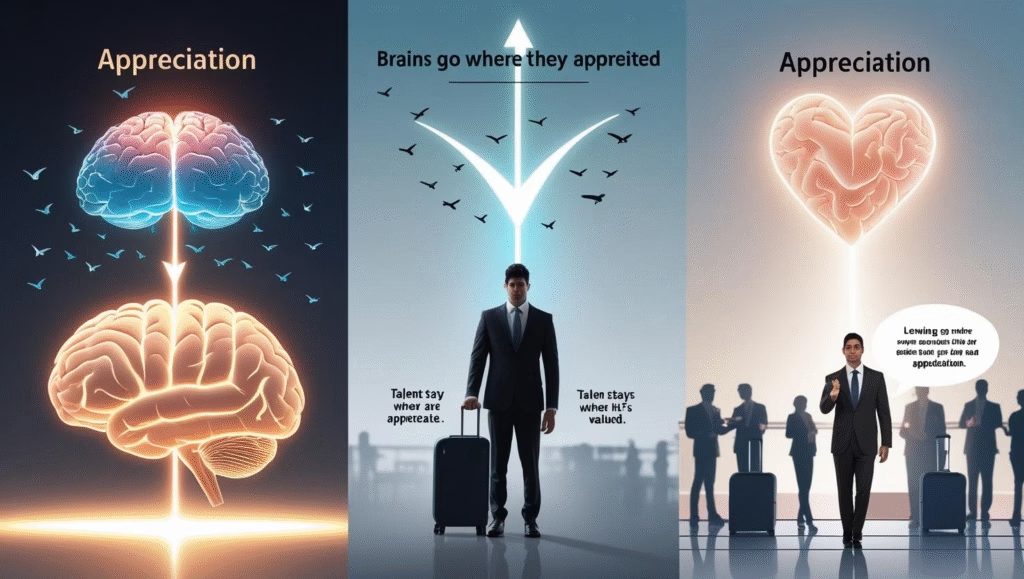: Brains Like Hearts Go Where They Are Appreciated – CSS 2025 Essay
Learn how appreciation fuels brainpower, creativity, and progress. A CSS 2025 essay with facts, stats, and global insights.
Introduction
Appreciation is one of the most powerful human needs. People want to feel seen, heard, and valued — whether it’s in families, workplaces, or nations. The quote “Brains, like hearts, go where they are appreciated” captures this truth perfectly. Talented people do not stay where they are ignored, insulted, or underpaid. They leave — and take their value with them. In a world driven by knowledge and creativity, ignoring brains is national suicide. This essay explores how appreciation connects to talent, development, and national progress.

young talent appreciation, Pakistan brain drain, youth migration 2025
- Introduction
- What This Quote Really Means
- The Link Between Appreciation and Retention
- Brain Drain in Developing Countries
- Global Statistics on Talent Migration
- Pakistan’s Case: Why Brains Leave
- Impact of Underappreciation on Society
- Real-Life Examples of Talent Seeking Recognition
- How to Build an Appreciative Culture
- Conclusion
What This Quote Really Means
The brain symbolizes talent, skill, and intelligence. The heart symbolizes emotions and passion. Both thrive where they are appreciated. If a workplace undervalues skilled employees, they resign. If a country fails to recognize its thinkers, they migrate. Appreciation is not just a nice gesture — it’s a basic human need that drives success.
The Link Between Appreciation and Retention
Appreciation boosts motivation. Studies show that 69% of employees would work harder if they were better recognized (Source: Gallup, 2023). In national terms, this means skilled doctors, scientists, teachers, and engineers stay only where their worth is acknowledged.
Countries like Germany, Canada, and Sweden invest in young talent and offer platforms for growth. As a result, they attract global minds. In contrast, countries that ignore or suppress their brightest minds suffer from brain drain.
Brain Drain in Developing Countries
Brain drain is the migration of educated individuals to countries where their skills are better appreciated. According to the World Bank (2023), over 35% of highly skilled professionals from developing countries migrate to developed nations.
In South Asia, Pakistan, India, and Bangladesh lose thousands of engineers, doctors, and researchers every year. In Pakistan alone, 832,000 professionals went abroad in 2022 — the highest number in a decade.
Global Statistics on Talent Migration
- United States hosts over 50% of top researchers from developing nations.
- Canada’s Express Entry system welcomes skilled workers with incentives and respect.
- Silicon Valley is built largely on immigrant brains who were once unrecognized in their home countries.
These figures prove that talent moves toward appreciation — just like hearts move toward love.
Pakistan’s Case: Why Brains Leave
In Pakistan, highly educated youth often face:
- Low salaries
- Lack of research funding
- Political instability
- Nepotism in job markets
- Disrespect for merit
The result? Thousands of students leave after graduation and never return. Universities and hospitals lose valuable minds. Innovation stalls. National progress suffers.
Impact of Underappreciation on Society
When brains go unappreciated:
- Nations lose productivity
- Innovation declines
- Youth lose hope
- Corruption rises
- National image weakens globally
A country that ignores its thinkers can never lead in technology, health, education, or global diplomacy.
Real-Life Examples of Talent Seeking Recognition
- Dr. Abdul Qadeer Khan, Pakistan’s nuclear hero, was initially ignored until his return from Europe.
- Malala Yousafzai received global awards — not from home first, but from international platforms.
- Arfa Karim, the youngest Microsoft Certified Professional, got recognition from Bill Gates — before local institutions appreciated her.
Such stories reflect a painful reality: our heroes often need foreign approval before being valued at home.
How to Build an Appreciative Culture
To stop the brain drain and build strong nations, we must:
- Promote merit over connections
- Offer research and innovation grants
- Recognize achievements publicly
- Involve youth in policymaking
- Celebrate local heroes in schools and media
In Finland, teachers are paid nearly the same as engineers. This signals respect and builds a stable, appreciated workforce.
Conclusion
Appreciation isn’t optional — it’s essential. Brains, like hearts, thrive where they are valued. For a nation to grow, it must retain its best minds. That means building a culture of recognition, reward, and respect. The quote holds a powerful message for countries like Pakistan: if we want to keep our talent, we must start appreciating it — loudly, openly, and consistently.
Discover more from
Subscribe to get the latest posts sent to your email.
